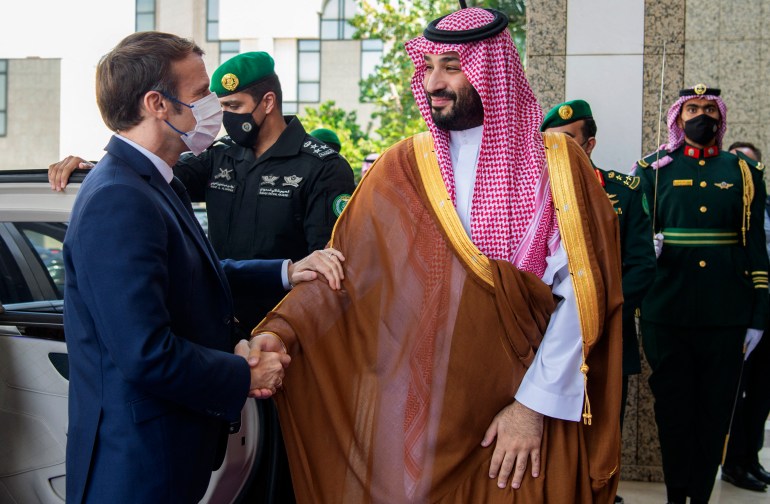Yesterday, Saturday, French President Emmanuel Macron announced a French-Saudi initiative to address the crisis between Riyadh and Beirut, while a Lebanese representative from the Mikati bloc said that Riyadh had given an indication of pushing towards supporting Lebanon and its government.
The announcement of the initiative came after Macron arrived in Jeddah, Saudi Arabia, after visiting both the Qatari capital, Doha, and the UAE, Abu Dhabi.
The Saudi Press Agency said that the French president discussed with Saudi Crown Prince Mohammed bin Salman Saudi-French relations, areas of partnership between the two countries, and the situation in the Middle East.
This visit comes a day after the resignation of the Lebanese Minister of Information, George Kordahi.
In a press conference following his talks with the Saudi crown prince, the French president said that they contacted Lebanese Prime Minister Najib Mikati, and assured him of Riyadh and Paris' commitment to supporting reforms in Lebanon with the aim of getting him out of its crisis.
In a statement on his Facebook page, Macron said that he had a frank and useful dialogue with the Saudi Crown Prince on the political priorities of security and stability in the region, with special attention to Lebanon.
He continued: We contacted the Lebanese Prime Minister and made joint pledges to work together, support reforms, and allow the country to come out of the crisis and preserve its sovereignty.
Resignation and explanations
Two days ago, the Lebanese Minister of Information, George Kordahi, announced his resignation from the government, and considered this step an opportunity to return things to normal with Saudi Arabia, and his previous statements regarding the war in Yemen had sparked a diplomatic crisis with the Gulf states.
Qardahi said - at a press conference in Beirut - that he decided to abandon his ministerial position and continue to serve his country from any position.
He added that he understood from Prime Minister Najib Mikati a few days ago that France wants his resignation before the French president's visit to Saudi Arabia in order to resolve the crisis.
Kordahi made it clear that the choice was left to him personally, and that he decided that the time was right now to offer something that would bring Lebanon out of this crisis, explaining that he had previously refused to resign to say that Lebanon did not deserve this treatment, as he put it.
He also said that he does not accept that it be used to harm Lebanon and the Lebanese in the Gulf countries.
Riyadh announced at the end of last October that it had summoned its ambassador to Lebanon for consultations, and requested that the Lebanese ambassador leave within 48 hours, following the publication of an interview with Qardahi in which he described the conflict in Yemen as absurd.
Connection and commitment
For his part, the French president referred to a call with Lebanese Prime Minister Najib Mikati, and said that the French and Saudi sides committed themselves to work together to support reforms in Lebanon, enable the country to emerge from the crisis, and preserve its sovereignty.
As for the Lebanese Prime Minister, Najib Mikati, he said that Qardahi's resignation was necessary, and that it would open a door to addressing the problem of the relationship with Saudi Arabia and the Gulf states.
Mikati considered that contact with Macron and the Saudi crown prince is an important step for resuming brotherly relations with the Kingdom.
In a tweet on Twitter, Mikati said he would like to thank French President Emmanuel Macron and Saudi Crown Prince Mohammed bin Salman for their keenness on maintaining friendship towards Lebanon.
In statements to Al-Jazeera, Nicolas Nahas, a deputy in the Lebanese Prime Minister Najib Mikati's bloc, announced that there is a serious discussion to support Lebanon and its government, noting that Riyadh gave an indication of pushing towards that.
In statements to Al-Jazeera, Nahas said that the contact of Emmanuel Macron and Mohammed bin Salman with Mikati is a first step that will be followed by steps, explaining that the contact did not address the recent Gulf measures, but he expected to return to them.
The same deputy indicated that the call lasted for a few minutes, and the details will be discussed later.
Emmanuel Macron (left) met yesterday, Saturday, Saudi Crown Prince Mohammed bin Salman in Jeddah (French)
Terms and objectives
This comes at a time when the Financial Times quoted a French official as saying that Riyadh stipulated the return of contacts with Lebanon with a visit by a Western leader.
The same official added to the British newspaper that the Saudi authorities had agreed to return their ambassador to Beirut, and it was not clear if this would actually happen.
Riyadh announced at the end of last October that it had summoned its ambassador to Lebanon for consultations, and requested that the Lebanese ambassador leave within 48 hours, following the publication of an interview with the Lebanese Minister of Information, George Kordahi, in which he described the conflict in Yemen as absurd.
In the context of his statements, the French official pointed out that Macron has intensified his movement with the approach of the French elections to achieve a breakthrough in his favour.

